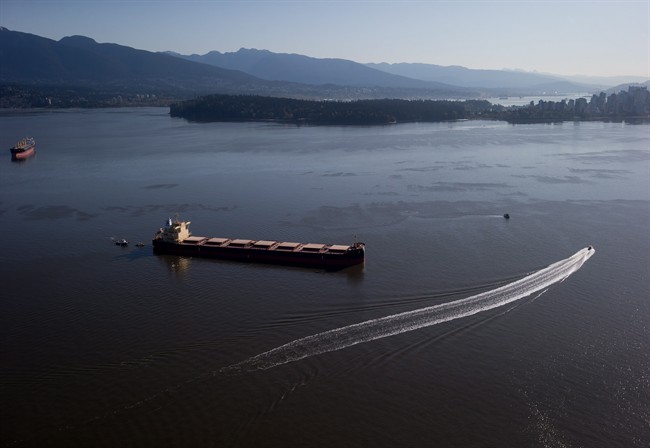The City of Vancouver says independent computer modeling shows up to 90 per cent of oil could wash up on local shores in case of a major oil spill.

The city says it has conducted its own investigation, in a joint initiative with the City of Burnaby and the Tsleil-Waututh Nation, in response to Kinder Morgan’s “failure to carry out analysis of the potential consequences of an oil spill.”
The independent modeling looks at four major oil spill scenarios in the Burrard Inlet.
The city claims that, in all modeling scenarios, between 50 per cent and 90 per cent of the oil would reach the shorelines within hours, causing significant impacts to human health, the environment and the economy.
It says the spill in Burrard Inlet would impact nearly all communities surrounding the Inlet.
The modeling showing how an oil spill would spread in Burrard Inlet:
The model is based on a 16 million-litre oil spill. Each dot in the animation represents 2,000 litres of oil.
In comparison, an estimated 2,700 litres of diesel fuel was spilled in the waters of English Bay by a cargo ship last month. The City of Vancouver was not notified of the spill until about 13 hours after the fact. Vancouver mayor Gregor Robertson was critical of the spill response, calling it inadequate and too slow.
In 2013, Kinder Morgan applied with the the National Energy Board to have its tanker traffic volume expanded. The proposal would see tanker traffic in Vancouver increase from five tankers per month to 34.
READ MORE: Pipeline expansion will increase tanker traffic nearly seven-fold
The municipalities say they are opposed to the seven-fold increase of oil tanker traffic. They are also concerned about Kinder Morgan Canada not disclosing details of their emergency preparedness and response plans and the adequacy of that plan.
Michael Davies, senior director, Marine Development for the Trans Mountain Expansion Project said in a statement:
Trans Mountain has been safely shipping petroleum products through the Burrard Inlet for more than 60 years. Marine safety has been an important priority in the development of our Expansion Project and Trans Mountain has conducted detailed studies and assessments in regards to spill modelling and response. We stand by our assessments that were conducted by leading experts in the fields of marine transportation and safety. That said, we will review this report with interest and would welcome the opportunity to sit down and discuss these findings with the Cities of Vancouver, Burnaby and the Tsleil-Waututh First Nation. Their study, ours and any others submitted will be considered by the National Energy Board as part of the review process for our proposed Project.
WATCH: City of Vancouver provides a model of potential oil spill




Comments